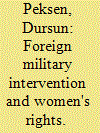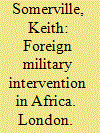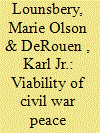|
|
|
Sort Order |
|
|
|
Items / Page
|
|
|
|
|
|
|
| Srl | Item |
| 1 |
ID:
109911


|
|
|
|
|
| Publication |
2011.
|
| Summary/Abstract |
A large body of scholarly work has been devoted to the possible consequences of foreign military intervention for the target state. This literature, however, tends to be state-centric and mostly neglects the insight from gender-specific theoretical and empirical perspectives. The purpose of this article is to examine the extent to which military intervention affects women's rights. It is argued that unilateral interventions are prone to diminishing women's status by encouraging the persistence or creation of repressive regimes and contributing to political disorder in the target state. If the use of armed forces ever helps or causes no damage to women's well-being, it will likely be during interventions led by intergovernmental organizations (IGOs). This is because IGO interventions are unlikely to protect or support an authoritarian, patriarchal political system. Furthermore, such multilateral missions will increase international awareness of women's status along with other human rights issues in the target society, thereby creating more pressure on the government to enforce women's rights. To empirically substantiate these arguments, three different indicators that tap socio-economic and political aspects of women's status are used, including the indices of women's economic, political, and social rights from the Cingranelli-Richards database. The results indicate that while women's political and economic status suffer most during unilateral US interventions, IGO interventions are likely to have a positive influence on women's political rights. Non-US unilateral interventions, on the other hand, are unlikely to cause any major change in women's status. Finally, military interventions in general have no major statistically significant impact on women's social rights.
|
|
|
|
|
|
|
|
|
|
|
|
|
|
|
|
| 2 |
ID:
028002


|
|
|
|
|
| Publication |
London, Pinter Publishers, 1990.
|
| Description |
x, 205p.hbk
|
| Standard Number |
0861878906
|
|
|
|
|
|
|
|
|
|
|
|
Copies: C:1/I:0,R:0,Q:0
Circulation
| Accession# | Call# | Current Location | Status | Policy | Location |
| 032748 | 960.32/SOM 032748 | Main | On Shelf | General | |
|
|
|
|
| 3 |
ID:
151711


|
|
|
|
|
| Summary/Abstract |
The empirical international conflict literature has given much recent attention to interstate armed force’s impact on human well-being. While empirical research has advanced our understanding of the phenomenon considerably, we argue that one conclusion that many studies have reached is preliminary. Some recent research contends that only full-scale war, and not force short of war, has a discernable impact on human welfare or physical quality of life (PQOL). We develop theory on one type of force short of war, large-scale foreign military intervention (FMI), and its potential effects on PQOL. Using interrupted time series and panel corrected standard error methodologies, we find that from 1960 to 2005 large-scale FMI had a statistically and substantively significant impact on the PQOL of populations in 106 developing countries. The specific effect that this type of armed force has depended in large part on the regime type of the target country.
|
|
|
|
|
|
|
|
|
|
|
|
|
|
|
|
| 4 |
ID:
147530


|
|
|
|
|
| Summary/Abstract |
Civil war peace agreements are prone to collapse. While some research suggests that multiple layers of power-sharing provisions lead to more viable agreements, others have suggested that negotiated settlements are not only more likely to return to violence, but that those cases will be more deadly as a result. We suggest here that previous research has failed to address the various ways that peace agreements emerge and that this context is crucial in explaining peace agreement viability. In some situations, rebels are likely to earn those concessions through battlefield success. Governments may feel compelled to address underlying grievances in order to stop the bloodshed and ultimately maintain some political clout in the postwar regime. In other cases, however, governments may feel pressure to engage in discussions and to provide concessions by outside actors, whether in the form of diplomatic intervention, economic, or foreign military intervention. Hypotheses are tested on all civil war peace agreements identified by the UCDP Peace Agreement Data-set for 1975–2011. Findings from logit and hazard models suggest that agreements brought about in the aftermath of military intervention on behalf of rebels are more likely to endure while those earned on the battlefield (i.e., stronger rebels) do not. In addition, mediation enhances peace agreement viability, while interventions on behalf of governments tend to undermine it.
|
|
|
|
|
|
|
|
|
|
|
|
|
|
|
|
|
|
|
|
|